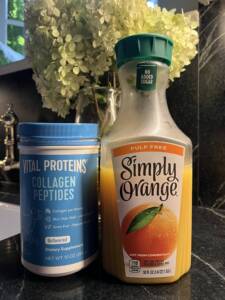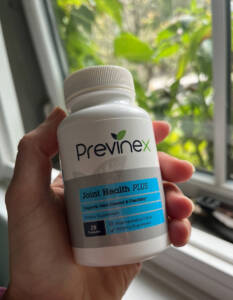According to Keith Baar, head of the Functional Molecular Biology Laboratory at the University of California Davis, “Collagen is the backbone of our tissues such as our bones, ligaments, and tendons. It holds them together and gives them shape.” The marketing is ahead of the research on collagen help to prevent and rehab injuries in runners but smaller studies do indicate that regular usage before running may do these things. Read on for the full details about collagen benefits for runners.
It’s no secret that I’ve battled injuries the past couple of years including a hamstring tear and a plantar fascia tear. As I ramp up my marathon training, I still have little “niggles” crop up in my soft tissue that makes me wonder what else can I do to stay healthy. Can taking collagen supplements prevent injuries?

Related: Lessons Learned from My Hamstring Injury
Everywhere you turn you see collagen supplements these days. They are at Target, in the drug store, and even in some gas stations promising to give you healthy skin, hair, and nails—and make you feel more youthful.
Related: Do PRP Injections Work? My Experience with a Torn Plantar Fascia

And many athletes swear by collagen, too. It’s the latest “shiny new toy” in the supplement world boasting to help you recover faster so you can train harder.
But is it true? And do we actually need to supplement collagen?
Indeed, getting vitamins and minerals from REAL FOOD is almost always the best and most effective way to get nutrients. But sometimes we don’t get enough in our diets or we don’t time it right for optimal uptake and benefit. That’s where supplements like collagen supplements may come in.
Related: Top 10 Best Supplements for Runners
I wanted to get to the bottom of whether or not collagen supplements or collagen powder really work and if we need to take collagen supplements to stay healthy or repair an injury.
In this article, I review the latest science and speak with a registered sports dietitian to find out what, if any, benefits there are from taking collagen plus a collagen supplement guide.
Table of contents
- What is collagen?
- What is collagen good for?
- How do we get collagen?
- What are collagen peptides?
- How do collagen supplements work?
- Do collagen supplements work? (What the science says…)
- How should you take collagen?
- How much collagen should I take?
- When should I take collagen?
- Should I take collagen every day (how long should I take collagen)?
- What collagen supplements are best?
- Should I take collagen?
- Collagen Supplement Quick Guide
So, let’s go!
What is collagen?
Okay, let’s start with the basics. Collagen is the most abundant protein found in our bodies—about thirty percent of all the protein. It is made up of amino acids glycine, proline, hydroxyproline and arginine and is used to make connective tissues, bones, muscles, cartilage, and skin.

According to Keith Baar, head of the Functional Molecular Biology Laboratory at the University of California Davis, on the We Do Science Podcast, “Collagen is the protein that holds together everything in our body in an intracellular matrix. It is the backbone of our tissues such as our bones, ligaments, and tendons. It holds them together and gives them shape.”
There are many different types of collagen, but the three most important for runners are Type I, II, and Type III.
- Types I and III are found in skin, bones, blood vessels, and connective tissue.
- Type I is 70 percent of the protein found in our tendons, 65-80 percent of the protein found in ligaments, and about 30-40 percent of the protein found in our bones.
- Type II is a major protein found in joint cartilage which allows for shock absorption.
- Type III collagen 3 is the main component of the netlike structures that support our soft tissues and organs
What is collagen good for?
Collagen is good for the health your hair, skin, joints, and bones. There are other purported benefits that collagen can help your gut health, brain health, and even weight loss.
Early research indicates that taking collagen supplements can help repair and prevent injuries in athletes. These are the main reasons why runners should consider taking collagen supplements.
Related: The Danger of Low Iron in Female Runners
How do we get collagen?
Our bodies naturally make collagen. They do this by grabbing the ingredients they need (glycine and proline and other nutrients, like vitamin C, zinc, and copper) from the food we eat or supplements.
Collagen synthesis is stimulated through exercise. Dr. Baar explains that our tendons and ligaments don’t have a blood vessel supply so when we exercise these tissues act like sponges in which the liquid is rung out. And then it soaks up the liquid around it which has the building blocks for collagen.
“I explain it to my students that exercise is like the address on a letter for collagen, exercise tells it where to go,” he explains.
Collagen is also naturally found in animal products that have connective tissue like meat and fish.
Foods high in collagen include:
- Meat
- Fish
- Eggs
- Bone broth
- Gelatin (Jello)
In fact, when you boil broth, the film at the top is collagen.
Note: We get collagen only from animal products, there are no vegan or vegetarian collagen supplements (but there are fish-based collagen powders). However, our bodies can make it by combining broken-down amino acids and other nutrients that support collagen production.
What are collagen peptides?
There are two types of collagen supplements:
- Hydrolyzed collagen (also known as collagen peptides): broken down collagen cut by acid so that it doesn’t form a gel and is more easily dissolvable and digestible.
- Gelatin collagen: Collagen degraded by heat (cooked)
Both have almost identical nutritional profiles and no study has found significant evidence that one is better than the other. And, by better than the other, I mean one doesn’t seem to spur more collagen synthesis leading to stronger connective tissues, joints, and bones than the other.
Dr. Baar says some people may handle gelatin better, adding meat eaters tend to digest and absorb collagen better overall.

How do collagen supplements work?
Collagen supplements work by supplying your body with the ingredients it needs to make collagen. The cells see these amino acids and signal to make more.
The collagen ingredients in food need to be broken down to into amino acids and peptides to make collagen, but in collagen supplements, they are already broken down. The work is already done for the body to grab what it needs to synthesize collagen.
In effect, supplements are like the pre-chopped veggies you buy from the store so all you have to do is throw it in the pan to sauté for supper.
Related: Healing Foods: What Foods Help Heal Injuries?
Do collagen supplements work? (What the science says…)
According to Dr. Baar and registered sports dietitian Megan Robinson, the marketing is ahead of the science when it comes to collagen. Most of the studies are small, performed on trained athletes, and didn’t control for variables such as diet and exercise.
Specifically, the research is unclear on if:
- any protein such as whey, not just collagen, promotes collagen synthesis,
- if taking collagen supplements promotes targeted collage synthesis where it’s needed in the body, and
- if collagen synthesis happens by taking collagen without loading (e.g. exercise or physical therapy).
BUT that doesn’t mean you should count collagen out as a potentially helpful supplement. Indeed, we can piece together that taking collagen plus exercise may have beneficial results.
Indeed, there are several small studies that show the potential benefits of collagen when it comes to:
- Preventing injury and
- Rehabbing injury
Some key studies include:
- A small study on eight men published in the Journal of Clinical Nutrition found that taking 5 to 15 grams of collagen with 500 mg of vitamin C within an hour of exercise helped double the rate of collagen synthesis in the ankle. The researchers concluded that taking collagen with vitamin C “could play a beneficial role in injury prevention and tissue repair.”
- A meta-analysis of studies published in International Orthopedics showed collagen supplementation to be effective in improving osteoarthritis symptoms.
- Perhaps most interesting, a study in the Journal of International Sport Nutrition and Exercise Metabolism by Dr. Baar on an NBA basketball player with essentially a hole in his patellar tendon showed that taking 15 g collagen and 225 mg of vitamin C an hour before isometrically loading the tendon not only repaired it but made it stronger. He had no hole, no pain, and the tendon was thicker. Dr. Baar and his team concluded, “collagen synthesis can be enhanced by supplementing the diet with gelatin or hydrolyzed collagen.
Related: 9 Steps to Return to Running After Injury
How should you take collagen?
It’s best to take a collagen supplement such as collagen peptides or collagen powder before exercise. Aim to take about 15 mg of collagen with about 250-500 mg vitamin C (a glass of orange juice) about an hour before you exercise.

You can take it anytime and still have benefits, says. Dr. Baar. But it is more targeted when you take it before exercise as the tissues are more able to soak up the ingredients and synthesize collagen.
How much collagen should I take?
You want to take about 15-20 mg of collagen before you exercise.
Studies show that little benefit is found with 5 mg of collagen and more benefit is found with 10-20 mg of collagen.
When should I take collagen?
You want to take collagen about an hour before you exercise. This is when the soft tissues are more susceptible to soaking in the nutrients to synthesize collagen.
Should I take collagen every day (how long should I take collagen)?
Yes, you can take collagen every day, especially if you are an athlete who trains almost every day.
Taking collagen supplements every day is also especially beneficial for older athletes (such as master’s runners over 40 like me) who do not synthesize as much collagen. In fact, collagen production starts to decline at the young age of 25!
Taking collagen supplements every day is not harmful to your health as what you do not use is excreted. However, taking too much could upset your stomach.
What collagen supplements are best?
The best collagen supplements come with a serving of 15-20 mg and are coupled with 250-500 mg of vitamin C. This is because Vitamin C is needed for collagen synthesis.
You also want the supplement to follow Good Manufacturing Practices and is NSF-Certified for Sport.
Some brands that include collagen and vitamin C include and are some of the best collagen for runners include:
I personally use Vital Proteins collagen powder. I also supplement with Previnex Joint Health which includes naturally occurring collagen from fish.

I have noticed a big difference in the way my joints feel with training intensity increase since taking this Previnex Joint Health supplement which is clinically proven to reduce joint pain and improve joint health in as little as 7 days. Save 15 percent with code TMR15. Also, get your money back if you aren’t happy!
Note: If you run later in the afternoon or after breakfast, then you likely don’t need a collagen supplement that’s coupled with vitamin C.
Should I take collagen?
So, are collagen supplements worth your time and money? Should you take collagen?
Taking a collagen supplement is a simple and low-risk way to prevent injury.
You should especially consider taking a collagen supplement if you are someone who:
- Suffers from running injuries
- Is over 30, and
- Consistently trains with intensity (speed) and/or higher volume (more than 30 miles a week)
Collagen Supplement Quick Guide
Here’s a recommended guide to taking collagen.

- Find a reputable collagen powder or collagen supplement that follows Good Manufacturing Practices and is NSF-Certified for Sport.
- One hour before exercise, take your 15-20 mg collagen supplement. You can dissolve in your coffee or put in a smoothie or shake.
- If your supplement does not contain 250-500 mg of vitamin C or you take it in the morning, drink a half or full glass of orange juice with it.
- Do this regularly before exercise.
Bottom line: Collagen offers a lot of potential benefits for runners. It is not a guaranteed magic bullet to prevent or heal injuries but it can’t hurt! If you are concerned about getting injured, then trying a collagen supplement may be helpful.
The biggest thing is figuring out how and when you will take it. Personally, I struggle with taking it in my coffee with vitamin C in the morning because it is just too much for my stomach sometimes.
If you want guidance with your training, check out my run coaching services. Also, be sure to check out my free training plans:
- Postpartum Training Plan
- After a Break Training Plan
- 5k Training Plans
- 10k Training Plans
- Half Marathon Training Plans
- Marathon Training Plans
- Strength Training Plan
